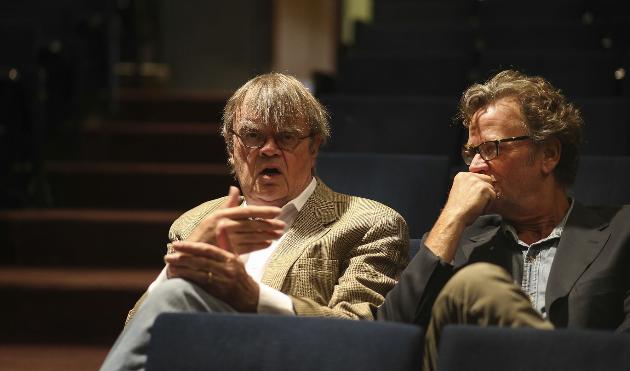


The writer and radio host launches his first play, “Radio Man,” in which he does — or perhaps does not — reveal himself.
Garrison Keillor arrived late for a rehearsal at History Theatre. If this shock-topped scarecrow had emerged from a New York subway at 4 a.m., you would not have blinked. He’d spent a long day “rewriting like crazy” the script for “Radio Man,” his first stage play, which has its world premiere Saturday.
Keillor’s rewrite had preceded him to the rehearsal room and caused quite a stir.
“He’s rewritten the whole first act,” said director Ron Peluso, leafing through the pages. “I’m having a heart attack right now.”
Now as Keillor entered the rehearsal room with a friendly wave to the cast, Peluso approached.
“You were busy,” he said to Keillor. “There were a lot of surprises, so we should probably read through this.”
Keillor nodded silently, watching choreographer Jan Puffer and the actors work their way through what used to be the opening number.
“Who’s the Sharks and who are the Jets?” he quipped.
To actor Pearce Bunting, who portrays the Host in “Radio Man,” he said, “You play me, and so you do not dance. Brought up by Christian people.” Keillor watched for a few minutes, snapping his fingers sporadically to the music, but quietly he told Peluso that he felt the dance was too much — a distraction from the story.
“The guy who plays me should not be touched by the other people,” he joked with the cast at one point. “No touching.”
“Can I touch them?” Bunting asked.
“Be very careful,” Keillor said.
At 72, Keillor celebrates the 40th anniversary of “A Prairie Home Companion” this year. And he has added “playwright” to his long line of descriptors. He loves it, wants to do more and has ideas for future scenarios. On this day, however, his effort was focused on the present, on “Radio Man,” a loosely autobiographical play with music about Keillor and “Prairie Home.”
The main character, Keillor said, is an “Everyman, a schnook who gets pushed around by everybody. … His major foible is that he has allowed himself to be the subject of a play.”
Waiting for 20 years
When Peluso became artistic director at History Theatre 20 years ago, he invited Keillor to write a play. The two knew each other through Peluso’s wife, Sue Scott, who has been in the “Prairie Home” cast for 22 years.
Keillor finally took the bait a couple of years ago.
“He said, ‘I think I should write a play about the 40 years of “Prairie Home Companion,” ’ ” Peluso recalled. “He said, ‘I’ll play the dad or the janitor.’ ”
Early drafts were too much about the show and less about the man. “It’s called ‘Radio Man.’ We want to get to know more about him,” Peluso remembered telling Keillor.
And did the writer heed this advice?
“I think he has,” Peluso said. “The personal stories he goes to — this man has made some mistakes in his personal, emotional life. He was very brave to write about that stuff.”
Keillor was not so sure in a separate interview.
“He may have pushed, but I don’t think he got what he was looking for,” he said of Peluso’s desire. “I don’t reveal myself in this play because I don’t think I’m that interesting.”
For example, he said, look at Tennessee Williams, whose work he admires. Williams came from a crazy family, was gay in an oppressive era, could be combative and reckless and felt constant guilt about his sister, Rose.
“Compared to that, I’m pretty normal,” Keillor said. “I don’t come from the South.”
No, just Anoka County. He laughed.
“My people were very cheerful,” he said. “My parents loved each other, were openly affectionate. They were evangelicals, and growing up as an evangelical does not qualify as a big traumatic experience.”
His life was far removed from Hollywood movies that portray evangelical childhoods as scary and spooky.
“These were gentle, kind people,” he said of his relatives.
As he watched rehearsal, Keillor had a side conversation with Jonah Harrison, who plays Young Garrison Keillor.
“How does it feel to be just a memory, the ghost of my childhood?” Keillor asked Harrison. “I doubt you have a lot in common with my childhood. What do you have to draw on, from your own experience?”
Tough questions for a young actor, but they lead Keillor into stories about being a kid, running out to the woods and the ravine behind his home, where he’d meet other 13-year-old boys for games of chase and war.
Keillor grew up with the ambition of making his living as a writer, which marked him as an outsider, but even there, he said, most of his contemporaries “felt they didn’t quite belong.”
‘I want to be a playwright’
Playwriting suits Keillor. He hopes to do more of it.
The work is sociable, unlike the solitude of book writing, and “the beauty of a play is that you create something that you’re not in.” Unbidden, he talks about a “Lake Wobegon musical,” or a screenplay. He did write for Robert Altman’s film “A Prairie Home Companion,” but that was on Altman’s dime.
He threw Peluso with his extensive rewrite 17 days before opening, but that’s how the business works.
“I thought it was very jumpy, with a lot of transition difficulties,” he said.
He also wanted a larger moment for the Host at the beginning, to give Bunting a chance to win over the audience before the razzmatazz of the dance takes over. Then there were a couple of characters who deserved better — Mary Louise, the ex-girlfriend, and Marilyn, who represents a good-hearted Lutheran woman who gets overwhelmed by a bigmouth rival.
“I have to do something for Marilyn so she can stand up,” he said with a sympathetic tone of obligation.
After a break, Keillor, Peluso and the cast gathered to reconsider the new version. This was a Wednesday, and Keillor had told Peluso that he would deliver his final rewrites by Saturday. Peluso begged for Friday.
When Keillor addressed the troops, he thanked them for their patience and assured them he’d be done by the director’s deadline.
“I turned around a lot of things in Act One,” Keillor said. “It’s a more studied opening, and I’ve taken Pearce’s narrative from later on and put it together in one place. I’ve tightened things up, made things more coherent, I hope. Most of what you’ve gone to the trouble of learning is still there, just in another place.”
Then it was back to work. The playwright never rests.
Go to StarTribune.com